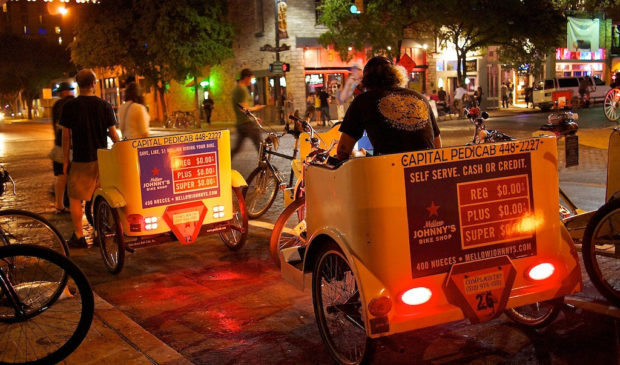Urban Transportation Commission endorses electric pedicab pilot
Tuesday, August 15, 2017 by
Caleb Pritchard The Urban Transportation Commission gave its blessing last week to a plan that could give pedicab operators an extra, electric boost.
The commissioners voted nearly unanimously on Aug. 8 in support of a pilot program that would allow companies to outfit some of their bikes with electric motors that would make pedaling up steep hills or over long distances easier.
“If this is successful, this pilot program will lead to a low-cost, quick way to make pedicabs an option for more people to go more places,” Patricia Schaub told the commission.
Schaub and fellow pedicab operator David Knipp brought the draft recommendation before the commission after broaching the topic during citizens communications at last month’s meeting. The Austin Transportation Department began collecting public input on the notion of the pilot program last October, according to department spokesperson Jen Samp.
The city currently allows 503 licensed pedicabs to operate in an area roughly bounded by 38th ½ Street and Oltorf Street to the north and south, and Mopac Boulevard and Pleasant Valley Road on the west and east.
Since they were introduced in the early 2000s, the market has changed dramatically. Sweeping redevelopment of Central Austin, along with an increase in both the number and global popularity of major events, has driven up demand, while new competitors in the form of transportation network companies and electric taxicabs have increased competition.
Knipp argued that the electric motors would level the playing field. He told the Austin Monitor that the devices would be powered by 24- to 48-volt batteries and would only be used to help drivers maintain the same speeds they could otherwise achieve without assistance on a level surface. Knipp said the devices would expand pedicab access to drivers who otherwise might not be able to meet the industry’s rigorous physical demands, a point seconded by fellow driver Dan Harmon.
“As I’m aging, it’d be nice to have the assist for my knees,” Harmon told the commissioners. He also added that the Circuit of the Americas allows electric-assist pedicabs on its property. Because he can serve more customers with less effort at Circuit of the Americas events, Harmon said he can lower his prices.
“I don’t think it’s necessary to charge out the wazoo for a two-mile ride if it can be done simpler and more efficiently,” he said.
Commissioner Beverly Silas questioned how the proposed year-long pilot program would be measured. Austin Transportation Department’s Lee Davila explained that staff would develop those metrics between now and the expected launch of the program on Oct. 1. While Knipp and Schaub originally requested to start the program a month earlier – in order to have it in place in time for the Austin City Limits Music Festival and University of Texas home football games – Davila said that staff needed more time to have fact-finding conversations with peer cities where electric-assist pedicabs are legal.
“We want ample time to do that research,” he said.
The role that representatives of the pedicab industry have played in helping to get the pilot program to its current stage did not sit well with Commissioner Kelly Davis.
“I’m afraid truthfully that the pilot program might have this inertia and be skewed to finding favorable results especially if we allow the same industry, the same people that are asking for this, to develop the metrics to and to evaluate it, when it does seem clearly like it’s in their economic interest to find that it’s a big success,” she said.
Commissioner J.D. Gins countered that it’s acceptable for businesses to succeed and that a thriving pedicab industry provides a greater good for the city.
“That means that more people are getting rides and less people are in cars. Less people are stuck in traffic,” Gins said.
The commission ultimately voted 8-1 to support the pilot program. Davis ended up being the only vote in opposition. Commissioners Mario Champion and Alex Reyna were absent.
Photo by Andy made available through a Creative Commons license.
The Austin Monitor’s work is made possible by donations from the community. Though our reporting covers donors from time to time, we are careful to keep business and editorial efforts separate while maintaining transparency. A complete list of donors is available here, and our code of ethics is explained here.
You're a community leader
And we’re honored you look to us for serious, in-depth news. You know a strong community needs local and dedicated watchdog reporting. We’re here for you and that won’t change. Now will you take the powerful next step and support our nonprofit news organization?



